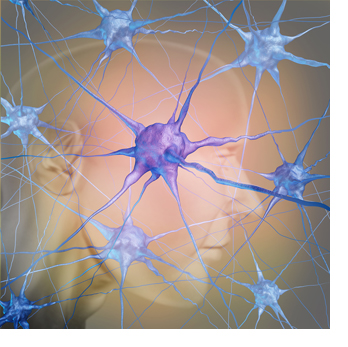
Schizophrenia: Impaired Activity of the Selective Dopamine Neurons
German-American team of researchers finds neurophysiological correlates for cognitive and emotional symptoms in a schizophrenia mouse model.
February 17, 2015—Schizophrenia is not only associated with positive symptoms such as hallucinations and delusions, but also with negative symptoms e.g. cognitive deficits and impairments of the emotional drive. Until now, the underlying mechanisms for these negative symptoms have not been well characterized. In the current edition of the Proceedings of the National Academy of Sciences (PNAS) a German-American team of researchers, with the cooperation of the Goethe University, reports that a selective dopamine midbrain population that is crucial for emotional and cognitive processing shows reduced electrical in vivo activity in a disease mouse model.
Schizophrenia is a severe and incurable psychiatric illness, which affects approximately one percent of the world population. While acute psychotic states of the disease have been successfully treated with psychopharmaceutical drugs (antipsychotic agents) for many decades, cognitive deficits and impairments of motivation do not respond well to standard drug therapy. This is a crucial problem, as the long-term prognosis of a patient is determined above all by the severity of these negative symptoms. Therefore, the shortened average life-span of about 25 years for schizophrenia patients remained largely unaltered in recent decades.
"In order to develop new therapy strategies we need an improved neurobiological understanding of the negative symptoms of schizophrenia" explains Jochen Roeper of the Institute for Neurophysiology of the Goethe University. His American colleagues, Eleanor Simpson and Eric Kandel at Columbia University in New York recently made an important initial step in this direction. They created a new transgenic mouse model based on striatal overexpression of dopamine typ 2 receptors, which displayed typical signs of cognitive and emotional negative symptoms similar to those occurring in patients with schizophrenia. The researchers detected typical impairment in working memory with corresponding neurochemical changes in dopamine in the prefrontal cortex. However, the underlying neurophysiological impairments of dopamine neurons remained unresolved.
Now, Simpson and Roeper, in cooperation withmathematician Gaby Schneider of Goethe University and physiologist Birgit Liss of the University of Ulm have succeeded in defining the neurophysiological impairments with the dopamine system. They were able to show, with single cell recordings in the intact brain of mice, that those dopamine midbrain neurons responsible for emotional and cognitive processing displayed altered patterns and frequencies of electrical activity. In contrast, adjacent dopamine neurons, which are involved in motor control, were not affected.
The researchers were also able to show that—in line with the persistence of cognitive deficits in mice and patients—the pathological discharge patterns of dopamine neurons persisted even after the causal transgene had been switched off in adult mice. "This result emphasizes the presence of a critical early phase for the development of cognitive deficits in schizophrenia" according to Roeper. He and his colleagues are currently examining how the neuronal activity of dopamine neurons changes during the working memory tasks. Roeper summarises the importance of the research work: "Our results show that altered neuronal activity of selective dopamine neurons is crucial for schizophrenia."
ARTICLE:
“Increased dopamine D2 receptor activity in the striatum alters the firing pattern of dopamine neurons in the ventral tegmental area,” Sabine Krabbe, Johanna Duda, Julia Schiemann, Christina Poetschke, Gaby Schneider, Eric R. Kandel, Birgit Liss, Jochen Roeper, and Eleanor H. Simpson. PNAS 2015; published ahead of print February 9, 2015, doi:10.1073/pnas.1500450112.
